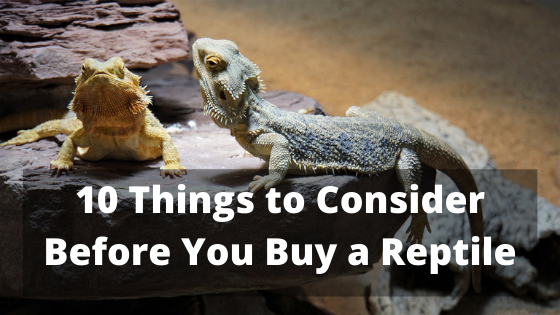As you consider buying a snake, lizard, aamphibian, or other herp (reptiles and amphibians), there are a number of things you should know. It’s important to consider these things well in advance of purchasing an animal that may prove to be ultimately unsuitable. Research a species before you purchase.
Your first step in herp ownership should be a trip to the library, bookstore, or quality Internet sites to obtain as much information as possible. Also, remember that the initial purchase price of an animal is just a fraction of the cost of care. You will need to make allowances in your budget for housing, heating, feeding, veterinary care, etc. As you read about various species available, be especially aware of the following:
1. Regulations
Some states, counties, and cities have strict regulations on the keeping of certain kinds of reptiles and other animals. Before you make a purchase of this kind, check with your local Fish and Wildlife Department to see which regulations apply to you.
2. Adult size
How big will the animal grow, and what will you do when it reaches that size? That beautiful 20-inch Burmese python may fit well in a 5- or 10-gallon aquarium style tank now, but within 5 months, it’s likely to reach 5 feet, and it has the potential to grow to 18 feet at maturity.
3. Accommodation needs (habitat/husbandry)
It’s important to provide the proper living environment for your reptile. Cages or vivariums need to be escape-proof and you must provide enough space for mobility. You also need to consider factors like cleaning, sanitizing, and routine maintenance.
4. Feeding and nutrition needs
There are commercially available diets, but almost all herps require fresh fruits and vegetables as a majority of their diet. Some herps must be fed live food like mice or items such as live worms, brine shrimp, water fleas, or crickets, which can become costly. Raising your own feeder insects can save you money, but you will still incur expense in dusts or gutload products and supplements.
5. Temperature
Being cold-blooded, a captive reptile doesn’t have the luxury of maintaining its body temperature within the range that it needs. It has to rely on you to provide an environment that allows it to stay healthy. A temperature gradient should be provided to allow your herp to move from place to place as it needs to warm up by basking, or cool down. It’s also important to invest in a good thermometer and proper lighting. Depending on the species, you may also need to purchase specialized heating.
6. Lighting
Light provides your pet with specific vitamins for mineral metabolism, but also creates an environment that caters to the animal’s very nature; some herps are nocturnal, while others are diurnal. For many herps, a light source can be used for both light and heating. However, for species that require darkness with higher ambient temperatures than your room temperature, combined heating and lighting solutions won’t work and the two elements must be separated.
7. Humidity
Reptiles in the wild are accustomed to locations with fairly stable humidity. Depending on the animal’s needs, you will need to provide a means to regulate the humidity in your pet’s home. You may need to install misting equipment, drippers, or foggers. And, of course, if your pet is sensitive to humidity, a good humidity alert device is an absolute requirement.
8. Amount of care
If you select a herp that requires careful monitoring, you must be prepared not only to commit the time and energy to provide that monitoring, but also be prepared for emergencies like equipment failure, illness, stress, malnutrition, and general difficulty in keeping and handling. You’ll need to make arrangements for someone knowledgeable to take care of your herp if you’re away and if your herp gets sick, you want to be sure there’s a veterinarian in your locale familiar with herps.
9. Handling
If you’re looking for a pet you can handle a lot, you probably don’t want a herp. Among herps, there’s obviously a wide range in the amount of handling that is necessary, possible, or desirable. How you will, or can, approach the handling of your pet is something you must factor into the decision about which species to purchase. As always, after handling any reptile, hands must be washed to prevent the spread of disease.
10. Health risks
Reptiles carry Salmonella, a bacteria which can be transmitted to humans through direct contact with feces, or through contact with something that has been contaminated with feces. The disease is most commonly transmitted through oral ingestion after handling a herp or equipment that has been contaminated, through open cuts/sores during handling, and through direct contact with contaminated soil or environmental items.
